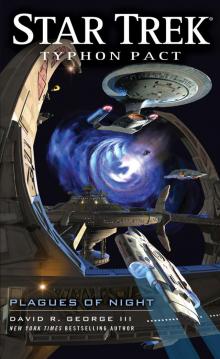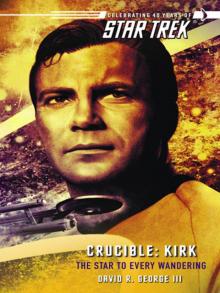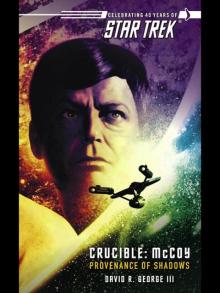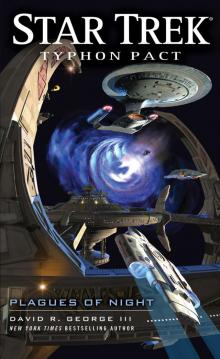- Home
- David R. George III
The Fire and the Rose Page 10
The Fire and the Rose Read online
Page 10
When Spock finished, Tremontaine spoke up in an attempt to defuse what could quickly escalate into a contentious issue. “Ambassador Liss,” she said, knowing that her words would be picked up, interpreted, and transmitted into the waters about the Alonis. “We’ve made progress on some very complex matters today, including settling on a list of potential sites for the base. Since it’s already fairly late in the day, may I suggest that we adjourn until tomorrow morning?” In her peripheral vision, she could see Spock peer over at her, but he said nothing.
Liss twisted her body in the water to face her chief of staff. Tremontaine saw Morat gesture rapidly with her pectoral fins, the Alonis equivalent of a nod. Liss looked back toward the clear wall dividing the conference rooms. “Yes, we’ll agree to recess until tomorrow,” she said.
“Very good,” Tremontaine said. “Until tomorrow then.”
Tremontaine watched as Morat swam over to a control panel in the side wall. There, for just a second, the water shimmered in an odd way, clearly manipulated by the force of the chief of staff’s mind. A second later, a light on the panel winked off, and then the transparent partition between the two delegations darkened to opacity.
Spock stood up and began gathering together some of the materials they’d brought with them today. At either end of the table, their assistants—Doran Slocumb, a human man, and Carissa Siddon, a Trill woman—did the same. Tremontaine collected the data slates and other items before her, then walked with Spock and their aides out to the conference center’s transporter station. From there, the four beamed to Lingasha, then boarded an airpod for the trip to the Federation Embassy. Doran and Carissa chatted along the way, but neither Tremontaine nor Spock contributed to the conversation. In the distance, the Alonis sun descended toward the horizon.
As the low buildings of the coastal city passed below, Tremontaine thought about the last couple of days. When she’d first seen Spock two mornings ago, meeting him after his sunup meditation and heading together to the early conference session, she’d sensed that something might be amiss. As the talks had gone on that day, she’d become convinced of it. She and Spock had just spent their first night with each other, and so it had been easy enough to draw the conclusion that he had that quickly come to regret his choice.
At the midday break, Tremontaine had pulled Spock aside and asked if something troubled him. When he’d hesitated, she’d pointed out his inconsistent focus and new-found reticence toward her as indications that something clearly weighed on his mind. He’d then told her of the visit he’d received that morning from Leonard McCoy, and of the death of Captain Kirk. Though pleased to hear that nothing had changed between her and Spock, she felt terrible for his loss. She knew that he and the captain had been close friends for nearly thirty years, much of that time serving together in Starfleet. News of the incident that had claimed Captain Kirk’s life had appeared on the comnets the next night, and not a single report had failed to mention Spock and the Enterprise.
The airpod stopped at the security checkpoint at the edge of the Federation grounds, then continued on toward the embassy, where it alighted on a pad beside the front entrance. The group entered the building, and once Doran and Carissa headed for their own rooms, Tremontaine walked with Spock to the wing that housed their suites. They didn’t speak until they reached her door, where Spock told her that he’d see her tomorrow, with no suggestion of having dinner together or of reviewing the day’s negotiations.
“Spock?” she said as he started toward his suite. He stopped, then slowly turned back to face her.
“Yes?” he said.
“Would you come in for a few minutes?” she asked. “I’d like to talk.”
Spock regarded her with a passive expression no different than that which he normally wore, and yet she still thought that she could perceive the anguish behind it. Am I really observing that? she asked herself. Or am I just imposing my own emotions onto Spock, believing that he must feel what I would feel if I lost such a close friend?
Spock averted his eyes for a moment, and Tremontaine knew that he would turn down her invitation. “Please,” she said, hoping to convince him.
“Very well,” he said. She nodded, then reached for the doorknob. She waited for the brief delay as security hardware and software verified her palm print, then pushed the door open after hearing the lock click free. Spock came in after her, and she felt grateful finally to be alone with him. She hoped that she could find a way to help him.
“Spock,” she said quietly, walking over to stand before him. She raised her hand, two fingers out, wanting only to comfort him, to provide some refuge from the loss of his friend.
“Alexandra,” Spock said, not reaching for her hand. “My mind is… disordered at the moment. It would not be a pleasant experience for you—” With her other hand, Tremontaine took hold of Spock’s wrist and lifted it up to where she still held out two fingers.
“I don’t care about pleasant experiences right now,” she said. “I care about you. Let me help.”
Spock looked at her without replying, his aspect unreadable. She could not tell if he would accept or deny her desire to help him, but he did not pull his hand from her grasp. Without taking her gaze from his, she brought his closed hand next to hers, then waited. After a moment, he unfurled his index and middle fingers, and Tremontaine pushed their tips against hers. A now familiar rush of energy surged through their point of contact. Tremontaine anticipated what would come next, the unfolding of her mind beside Spock’s, the tenuous, evanescent connection like an imagined breath on the back of her neck.
She withdrew her defenses, did it more easily now than the first time and the times since, understanding now the existence, the possibilities of that internal connection. But as her thoughts revealed themselves, Spock’s did not. She did not understand his absence, how he even could be absent from their link. Not knowing quite how to do it, she attempted to find him, to send her self in search of his self. She sought Spock out and grew more concerned when she did not find him, until at last-
She encountered the wall. Stretching left and right, up and down, an infinite, impenetrable barrier. A sense of separation filled Tremontaine’s being, and she grew distraught for Spock, seemingly lost to her right now.
And then an opening appeared in the vast barricade, a nebulous, glowing circle, seeming both real and unreal, a remembered dream, maybe, or a dream of a memory, but intimating access. Tremontaine pushed herself through it, into the shadowy area beyond. There, at last, she found Spock, his mind closed upon itself like a flower holding its petals tightly bound against a sudden frost.
Without hesitation, she let her mind drift toward his, seeking the coalescence of the two. She could feel his resistance, but also his need. All of her defenses down, she directed the filaments of her mind as best she could toward his own, which finally unwound just enough, at last permitting her being to interweave with his and-
The darkness within dragged her down, an anchor that threatened to hold her fast, to drown her in the depths of night. Tremontaine screamed silently, but then fought her fear, willingly accepted her overloaded descent into misery, tried to ease the affliction by sharing it. The awful weight of despair enveloped her, a bereavement complete and inescapable-
But not complete, no. Loss alone did not burden her, but also the terrible millstone of regret. How could she so easily have denied her closest friend his happiness, when she would not deny herself or others? Why had she not-
In no time, it all vanished, the strands of Spock’s mind retreating in on themselves, leaving Tremontaine alone in the void. Utterly lost, she flailed about, and—
Spock pulled his hand away from hers, severing their connection. Tremontaine worked to catch her breath, the experience of suffering his grief overwhelming. “Spock,” she said as she stared into his dark eyes, her voice barely a whisper.
He looked away, then moved across the room, away from her. “I am sorry,” he said without peering back aro
und. “I didn’t intend…” He turned toward her. “I did not mean for you to be so fully subjected to my pain.”
“Spock,” she repeated, still trying to gain her bearings. As though feeling posttraumatic stress, she wanted to collapse, to just sit quietly and find a way to overcome what had just happened to her. But she knew that she could not. Even across the room, she could see that Spock’s face had become drawn. Allowing her access to his sorrow had also unleashed it on himself, undermining whatever techniques he had used to box it away. “I still want to help,” she told him.
“There is nothing to be done,” Spock said. “There is only reality. I will mourn my friend and move on.”
Tremontaine took a step toward him, their physical distance making him seem so remote from her. He appeared exhausted now, and she knew that he had not slept well the past two nights, his slumber interrupted by troubling dreams. It amazed her that he could collect himself enough to present the illusion of normality.
Except that wasn’t precisely the case, now, was it? Tremontaine thought. In conference, Spock had looked and acted as he always had, but his focus had been compromised. He’d more than once failed to follow up on details as the two of them had planned, and she’d had to request an early end to today’s session in an attempt to avert any repercussions from his unexpectedly firm response to Ambassador Liss regarding Alonis access on the proposed starbase.
As though reading her thoughts, Spock said, “But there is the issue of my ability to remain effective in my role here.”
Tremontaine nodded. “You shouldn’t be here anyway,” she said. “I heard on the comnets last night that Starfleet will be holding a memorial service for Captain Kirk next week. Surely you need to be there.”
“I had thought to stay on Alonis,” Spock said. “Because of the complexity and importance of these negotiations and my expertise from a Starfleet perspective, my presence here seemed of greater value.”
To the Alonis and the Federation and Starfleet, Tremontaine thought, but not to you. She did not say that, though, not wanting to presume to tell Spock what would be best for him. Instead, she walked the rest of the way across the room and took his hand—not in any of the Vulcan ways he had shared with her, but simply holding his hand in hers. “You’re leaving then?” she asked.
“I am,” he said. “Starfleet and the BIA might object, as might the Alonis themselves. But my mind is not functioning at top efficiency right now, and so I fear my continued presence could actually damage the talks.”
“Your withdrawal won’t be an issue,” Tremontaine promised. She doubted that any of the factions would fail to comprehend the enormity of Spock’s loss or his need to attend Captain Kirk’s memorial, though she supposed that some might be making the common error of mistaking Vulcans’ strict emotional control for an emotional dearth. Regardless, she would ensure that Spock be granted the leave he required, bringing to bear the influence of her long and successful career, if need be.
“Thank you,” Spock said. “If you’ll excuse me, I need to book passage to Earth.” He tried to pull his hand from hers, but she held on to it.
“Let me do that for you,” she said. “Sit down and I’ll make you some tea. While you rest, I’ll find a way to get you from Alonis to Earth.”
“Very well,” Spock said again. She let go of his hand as he went to sit down on a nearby sofa, and then she headed toward the food synthesizer on the other side of the room. Thirty minutes later, she had found a transport traveling out of Ariannus that would get Spock to Earth in time for the memorial.
Tremontaine only wished that she were going with him.
The auditorium had filled to its capacity of one thousand, which did not include the several dozen dignitaries seated on the stage. The memorial had initially been planned for Starfleet Headquarters, but when it had become clear how many would attend, the organizers had opted to move the service over to the Starfleet Academy campus. Demand for a public commemoration would see another event held in a few days, on the grounds of the Cape Canaveral Museum, around the famed Pad B of Launch Complex 39. Here, though, people who had actually known James T. Kirk had gathered to remember him. Now, after two hours and numerous speakers, the ceremony appeared to be nearing its end.
Spock sat on the stage, between Starfleet Commander-in-Chief Smillie to his left and Dr. McCoy to his right. At the podium just ahead stood Robert Wesley, addressing the assemblage. Wearing formal civilian attire, Wesley had a well-lined face beneath a thicket of short gray hair. “Jim Kirk saved my life,” he said. “With so many members of Starfleet here today and so many citizens of Earth, I know that I’m far from the only one who can make that claim.” Spock knew that Wesley had been friends with Jim for more than four decades, since he had instructed the young Midshipman Kirk at the academy. Ultimately attaining the rank of commodore and commanding the starship Lexington, Wesley had later retired from Starfleet and become governor of Mantilles, once the Federation’s most remote inhabited world. “The man we honor today,” Wesley intoned, “was a true hero. Even though he left Starfleet earlier this year, the very last act of his life, fittingly enough, was to save the crew and passengers of a starship—coincidentally a new starship named for the ones he’d so long commanded: the Enterprise.”
As Wesley began to detail the captain’s long and distinguished record, Spock peered out into the audience, where he recognized so many of those attending. He saw in the front row Jim’s three nephews, his only surviving blood relatives. Beside them sat the former members of the Enterprise’s longtime command crew—Captains Scott and Sulu, Commanders Uhura and Chekov—as well as Commander Dennehy and Lieutenant Commander Saavik. Earlier, Spock had seen numerous others who had served with the captain, including Jabilo M’Benga, Christine Chapel, Ryan Leslie, John Kyle, Arex, Janice Rand, Dawson Walking Bear, and Kevin Riley. He’d also noted the presence of several women with whom Jim had been involved romantically: Areel Shaw, Janet Wallace, Carol Marcus, Antonia Salvatori.
Amid all of those familiar faces, and still others, Spock felt alone. Despite being seated next to McCoy, with whom he had experienced so much, his sense of seclusion remained strong. It is illogical, he upbraided himself, but to deny the truth would do nothing to alter it.
“Captain Kirk’s considerable list of accolades,” Spock heard Wesley say, “includes three Starfleet Medals of Honor, the Grankite Order of Tactics, the Distinguished Service Star, the Lewis and Clark Corps of Discovery Cross, the Archer Ribbon for Conspicuous Bravery….”
Spock had not seen or spoken to Jim for three months, since they had testified together at a Starfleet board of inquiry investigating the conspiracy that had resulted in the assassination of Chancellor Gorkon. At that time, on the threshold of resigning his commission, the captain’s energy and emotions had seemed at a low ebb. After the admirals had completed their questioning, Spock had talked with his friend, presenting his opinion that the captain might best be served by reconsidering his decision to leave Starfleet. But Jim had been adamant about his retirement, citing not only the distaste he held for the politics that he felt had overrun the service, but also his own need for a life removed from the responsibilities of leading hundreds, and of making decisions and taking actions that could affect billions, even trillions, of lives. More than anything, Jim had said, he wanted to find peace.
Not long after that, as Spock had settled into the training position he’d accepted with Starfleet, McCoy had contacted him to reveal that the captain had taken up some very dangerous activities, quoting Scott as saying that Jim wanted to “run a bloody decathlon across the galaxy.” Spock and McCoy had discussed the captain’s perilous behavior, concluding that he sought such thrills in order to fill the void in his life left by stepping down from the command of a starship. But though he hadn’t divulged it to McCoy, Spock had also thought that something else had contributed significantly to Jim’s apparent courting of death: loneliness.
“In his career,” Wesley told the audience,
“Jim Kirk traveled from the heart of the Federation to the galactic rim, from the Klingon Empire to beyond Questar M-One-Seven, from Romulan space out to the Aquarius Formation.”
From the time he had begun serving under Captain Kirk, Spock had perceived his commanding officer’s wanderlust, his desire to explore. But after the death of Gary Mitchell, Spock had also begun to catch occasional glimpses of the captain’s solitary nature. After the incident with the Guardian of Forever, those glimpses had become more frequent, Jim’s sense of aloneness seemingly deeper. A quarter of a century later, after the captain had claimed to be departing Starfleet for good, his isolation had appeared nearly complete. He had proceeded to withdraw not just from his professional life, but from his personal relationships as well. According to McCoy, it had only been in the last week or so of his life—after Starfleet had asked him to christen the new Excelsior-class Enterprise—that Jim had renewed ties with some of his friends.
Ever since they’d parted company after the board of inquiry, Spock had anticipated contacting the captain, particularly after learning of his participation in such dangerous pastimes. But then Spock had been summoned by the Bureau of Interplanetary Affairs and had accepted their offer of an ambassadorial post. A month had passed, and then a second and a third. Only once before had he and Jim gone for such a long period with no communication between them: after the Enterprise’s five-year mission had ended in 2270, when Spock had resigned his Starfleet commission and returned to Vulcan to undertake the Kolinahr training. But their friendship had lasted through those two and a half years and then for two decades afterward, enduring many difficult circumstances. It had seemed reasonable to believe that it would continue into Jim’s retirement.

 Serpents Among the Ruins
Serpents Among the Ruins The Fire and the Rose
The Fire and the Rose Star Trek: Typhon Pact 06: Plagues of Night
Star Trek: Typhon Pact 06: Plagues of Night Star Trek: The Lost Era - 08 - 2319 - One Constant Star
Star Trek: The Lost Era - 08 - 2319 - One Constant Star Star Trek: Deep Space Nine: Ascendance
Star Trek: Deep Space Nine: Ascendance Star Trek: TOS: Allegiance in Exile
Star Trek: TOS: Allegiance in Exile Crucible: Kirk
Crucible: Kirk Crucible: McCoy
Crucible: McCoy The Long Mirage
The Long Mirage Original Sin
Original Sin Star Trek: Typhon Pact: Plagues of Night
Star Trek: Typhon Pact: Plagues of Night Allegiance in Exile
Allegiance in Exile Sacraments of Fire
Sacraments of Fire Star Trek: Typhon Pact: Rough Beasts of Empire
Star Trek: Typhon Pact: Rough Beasts of Empire Star Trek: The Fall: Revelation and Dust
Star Trek: The Fall: Revelation and Dust